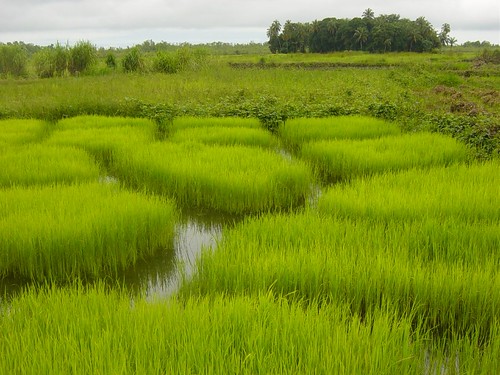Africa and the Green Revolution
Posted by Big Gav in africa, agriculture, green revolution
The Minneapolis Star Tribune has an interesting column on the futility of trying to make the "green revolution" work in Africa in an era of rising energy prices, saying traditional farming methods are more efficient - Forget Another ‘Green’ Revolution. Look to the Genius of Small Farmers.
Urban West Africa is Ground Zero in the global food crisis. From Dakar to Abidjan, the cities in this zone have experienced more protests against rising food prices than any other region in 2008.
The solution pushed by many global leaders is to increase crop yields in Africa via a new green revolution. They point to the apparent success of the last green revolution in the 1960s and ’70s, a concerted global effort in Asia and Latin America to disseminate a high-yield crop package of hybrid seeds, fertilizers and pesticides. The problem, they argue, is that these innovations never reached Africa. They are wrong.
The green revolution did touch Africa — in the form of cheap Asian rice, which began flooding African markets in the 1980s. I have been working or conducting research in West Africa on food and agriculture for more than 20 years. When I lived with a family on the outskirts of Bamako, Mali, in the 1980s, they still largely ate small grains (millet and sorghum) produced in the surrounding countryside. Today, they mostly purchase rice from Thailand, having developed a taste over several years for this (until recently) relatively cheap import.
Research shows that this pattern has been repeated in cities across West Africa, constricting markets for locally produced grains and forcing farmers to switch to other crops (such as cotton) as a source of cash or abandoning farming altogether for a life in the city.
The green revolution also was not of great benefit if you were a small, poor farmer in Asia. While the new package of hybrid seeds, fertilizers and pesticides did dramatically increase yields, the cost of such inputs was prohibitively expensive for the poorest farmers. The result was a silent reorganization of the Asian countryside: The poorest of the poor couldn’t compete, so they went to work for wealthier neighbors or moved to the city. Even wealthier farmers faced growing input costs as insects developed resistance to the most common pesticides, forcing the farmers to apply more and more chemicals or switch to expensive alternatives.
Global leaders are correct in asserting that the agricultural sector in Africa deserves more attention and support. The green-revolution approach, however, is flawed. For starters, many of the inputs required for higher-yielding crops, especially fertilizers, are petroleum-based. The cost of these inputs will only rise in step with the general upward trend in energy costs. Use of imported seeds (hybrid or GMO) and other inputs also concentrates power in the boardrooms of global agrochemical firms rather than in the hands of small farmers.
An approach emphasizing local or national food provision and appropriate technology is more sustainable and empowering for small West African farmers. Agricultural experiments comparing intensive African methods (involving the use of manure and compost as inputs and the intelligent mixing of multiple crops) to conventional Western cropping strategies have repeatedly shown the former to be more efficient in terms of energy consumed per unit of output. These methods have been inhibited by cheap imports and by agricultural agencies that emphasized industrial approaches to crop production.
While some emergency measures will be needed to address the food crisis in the short term, we can do better than another green revolution in the medium to long term. This will involve building on the knowledge of local farmers to develop agricultural approaches that are sustainable and accessible to the poor. It may also mean protecting national and regional food systems from unfair competition.
For years, global and national food policies have had an urban bias in that the provision of cheap food has almost always trumped environmental or social costs in the countryside. The results have been predictable: more underemployed urban residents hailing from rural areas and fewer small farmers. West Africa has some of the best small farmers in the world. We should support, not subvert, their genius.






